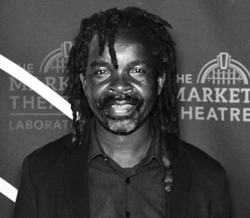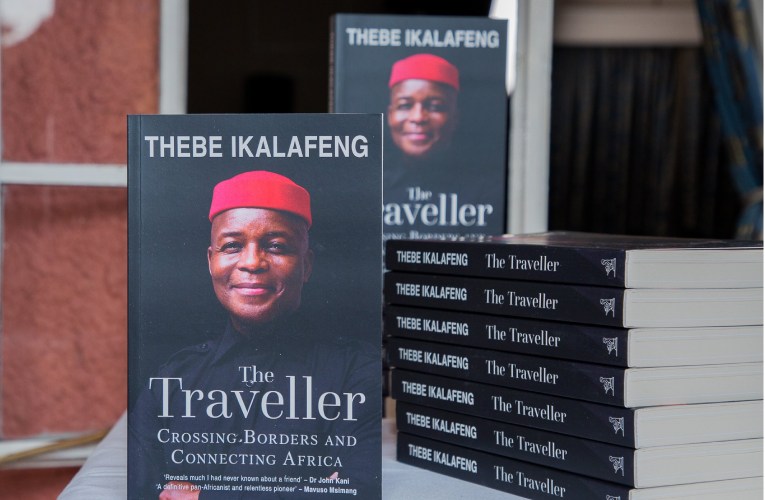Marketing guru Thebe Ikalafeng pens a memoir tracing his climber of the corporate ladder and how he rediscovered his African consciousness
By Edward Tsumele, CITYLIFE/ARTS Editor

At face value, that is only looking at the cover of the book and its title, The Traveller: Crossing Borders and Connecting Africa it could be easy to mistake leading brand expert Thebe Ikalafeng’s new book, a memoir for a travel book. In fact to be precise, this book is part memoir and part autobiography, The Traveller recounts the life of marketing magnate Thebe Ikalafeng, who found fame working at brands such as Nike and Colgate-Palmolive, and later as the founder of Brand Africa — and has become the prophet of a brand-driven African renaissance.
And of course the man is widely travelled, having set his foot on all the seven continents that constitute the earth, impressively including all the 54 countries in Africa recognised as such by the united nations as such, as well as more. He has also visited some islands of the African continent that are still controversially owned by former colonial powers, France and Britain.
But Thebe’s book is also about something else-his meteoric journey from his humble beginnings in Kimberley. Matriculated at a mission-linked private school, and also the book traces his footsteps through school and the corporate terrain -his time in the US where he went to study marketing, graduating with a masters degree in marketing before returning to South Africa to South Africa just as the country was to hold its first democratic election in 1994. On his return, the right time for an educated black person with an American education ready to take on responsibilities in the corporate world, indeed fortunes favoured Thebe.
In the book he speaks of how he was hired for a marketing job at Colgate-Palmolive, being groomed of course to play a role in its local operation in South Africa.
Indeed when Thebe came back, he found himself in the marketing department of the company’s South African division, where he steadily climbing up the ladder irrespective of constant push backs from some quarters, resisting change that in a democratic South Africa was inevitable and long overdue.
It was not a walk in the park though, as he reveals in the book that the white marketing director at the company at the time did not like him at all as he among other things was deemed to be too independent and connected to a powerful mentor at the company’s head office in the US. He recounts of countless episodes of being hauled to disciplinary hearings as the marketing director wanted him out of the company.
But that did not happen. Speak of being connected to real power and the cases that were brought against him, were painted as non-existent but the fat imagination of a white marketing director who did not want the kind of ‘corky’ employee like Thebe who did not know his place.
However the brand expert who is now highly regarded on the African continent as a marketing genius held onto his job for as long as he could. In fact, he kept on climbing the ladder, till he left for greener pastures on his own terms.
However it was while at the sports brand Nike where he distinguished himself as a leader in marketing, and here it would not be unfair to suggest that he was ahead of his peers in marketing, a sort of genius who took the brand high up there on the African continent. This was after his stint at Sun City, the North West Province resort where his contribution was of a mixed fortune.
However, Thebe at Nike really demonstrated what a talented marketer he is as he rose through the ranks to the powerful position of Chief Marketing Officer for Africa at Nike.
However, he reached the ceiling eventually and decided to venture out on his own. It was of course tough at first before he found his foot again in the marketing arena as an entrepreneur.
However as it turned out, this was a good decision as today, Thebe is now at the forefront of the marketing game on the continent after launching several marketing entities, including Brand leadership and Bard Africa.
Thebe has also lent his marketing expertise to political players on the continent, trying their best to harvest the hearts and love of the African population during elections. His political clientile base also grew on the continent, including as far as Ghana where he says he has travelled more than 100 times for both work and as a tourist.
But Thebe in the book explains the challenges of working in the political terrain on the African continent as a marketer who is only interested in serving the interest of his clients and not more. However some political players, he reveals regarded him a s a regime change agent when all he was doing was to assist his client to send out for example messaging that would connect with the population in a particular country within a specific political context. He speaks of the danger of assassination on the continent as emotions often ran high during election time, with some people even following him around the country in a veiled threat to his life. . In one country he was even accused of having been promised a piece of land for assisting a political player to election victory.
Thebe says that one country where he will not lend his marketing talent to political players is South Africa, and this is due to the fact that the way politics are practiced in South Africa is such that they are based on factional politics and therefore offering his services to a political players risks him being regarded by some as belonging to a particular faction and not seen as a professional selling his services on an open market.
Besides lending his marketing expertise to corporates and political players on the continent, Thebe and his companies have assisted in rebranding a number of prestigious educational institutions in South Africa and around the continent, such as UNISA and University of Free State, which at one stage found itself embroiled in a huge racial storm with allegations of racial abuse by some white students against black cleaners at the institution widely publicized and condemned by the public at large in the recent past.
However in the book, he admits that there were mistakes and challenges he and his companies had to navigate. For example the rebranding of the University of Botswana, commissioned at a great cost running into millions of Rands, did not fly. The design that reportedly seemed to diminish the importance of the traditional cow image on the university’s logo was not accepted by the Batswana. When the rebranded artwork was unveiled, there was a national outcry and the new administration at the university had to revert to the old design.
There must have indeed been pain inflicted by this failure on someone who all along had been associated with success in the marketing arena.
Thebe also speaks about another controversy that almost derailed the rebranding of UNISA when he discovered on the eve of the unveiling of the new logo that some upstart working for one of the institutions belonging to the Department of Sport, Arts and Culture had copied their brand as is, complete with the colours and the look and feel and presented it to the institution who went ahead and published it on a Sunday paper claiming it to be their new brand.
After a confrontation and then negotiation, the said institution conceded and withdrew the logo, paving the way for the current UNISA brand to be unveiled. That was a sweet victory for the marketing man.
And therefore reading this book, one gets the idea that here is someone who has worked very hard to reach the top in his game, and he has rewarded himself by embarking on activities that are of interest to his soul such as climbing mountains such as Kilimanjaro twice, travelling literally all over the world, buying expensive suits that have in fact won him a number of style awards over the years. However, now Thebe the African renaissance man is investing his money in buying African traditional clothes such as those made of the famous Kente fabric. In fact it would be hard to meet Thebe these days at functions wearing a Western suit.
He seems to have gone full circle -first embracing Western attire that has won him several awards, and now has shed those ties and the suits for African traditional clothes. He indeed seems to have reconnected with his African roots and spirituality, something that he seemed to have lost as he traversed the corporate ladder donning strictly Western attire.
Indeed The Traveller: Crossing Borders and Connecting Africa is an important book to read as not only will it leave you inspired by the success achieved by a person born in one of the rural mining provinces of South Africa, but a person who grew up till July 2024, not knowing beyond a name who his father is.
The author reveals that he only connected with his father’s people in July this year, but unfortunately his dad had long passed on in 1983.
“Until then all I knew was what my mother told me when I was in my 40s, that the man who fathered me had been from Steynsrus (in the Free State) a town she had never visited since they had met in the Stilfontein where he lived then,’ he writes.
Thebe’s maternal ancestry are in Botswana, and it looks like the discovery of his father’s roots is t he closure he needed to fit the missing puzzle of his life.










